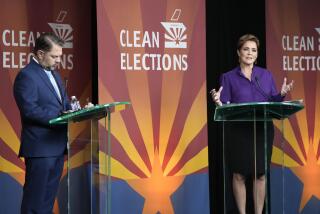Three Republicans fight for the GOP nomination to challenge Boxer
- Share via
Reporting from Sacramento — The Republican candidates for U.S. Senate traded foreign policy insults in a tense first debate Friday, with businesswoman Carly Fiorina hitting former Rep. Tom Campbell for associating with supporters of terrorism and Campbell accusing Fiorina’s campaign of smearing him as anti-Semitic.
“That whispering campaign, that silent slander stops today,” Campbell said, his hands and voice shaking in the first minutes of the hourlong debate on “The Capitol Hour” on KTKZ-AM (1380).
Campbell called for the debate after earlier Fiorina attacks on his congressional record on Israel, including two efforts to trim economic aid to the nation, and for connections with men who later pleaded guilty to or were charged with crimes associated with terrorism.
The debate was Fiorina’s first as a political candidate, and the former chief of Hewlett-Packard aggressively confronted Campbell. He shifted from the contest for governor in January and has since led in early polls in the race for the nomination to oppose Democrat Barbara Boxer in November.
“I have been very clear: I do not believe Tom Campbell is an anti-Semite and I have never called him one,” Fiorina said. “I do believe Tom Campbell’s record is decidedly anti-Israel and many in the Jewish community agree with me.”
The third candidate in the race, underdog Assemblyman Chuck DeVore, largely stayed out of the fray, allowing his two competitors to slash each other’s records and mostly ignore him. DeVore and Campbell participated face-to-face in the studio with moderator Eric Hogue; Fiorina called in from her home in Los Altos Hills.
The debate about Israel policy was part foreign policy discussion and part strategic imperative. Many of the Republican primary’s most reliable voters are evangelical Christians who have strong ties to Israel.
Campbell reiterated his support for Israel, noting that he consistently supported military aid to the nation and flew to Israel as Iraqi dictator Saddam Hussein was launching Scud missiles at the country during the first Gulf War. He defended a vote against Jerusalem being the nation’s undivided capital, insisting it was part of a Democratic political maneuver to embarrass then-President George H.W. Bush.
“That’s a really interesting and frankly intellectually contorted explanation,” Fiorina replied. “The reality is 33 other Congress people agreed with you. Everyone else disagreed.”
But Fiorina also had to explain her record, specifically the actions of a Hewlett-Packard subsidiary that sold printers to Iran, which is subject to a trade embargo.
She has previously said she had no knowledge of illegal sales under her tenure despite the fact that the subsidiary was honored as the company’s wholesaler of the year in 2003. Hewlett-Packard cut off ties to the United Arab Emirates-based subsidiary after reports came out about the sales in 2009, four years after she was fired from the company.
“This is a classic case of Chuck DeVore,” Fiorina said. “The truth is, and he knows this to be true, Hewlett-Packard has been in compliance with all United States laws. These accusations that Hewlett-Packard did something unlawful are false.”
DeVore and Fiorina continued to criticize Campbell’s ties to individuals who donated to a past campaign and, years later, pleaded guilty to or were accused of crimes. The most notable is Sami Al-Arian, a professor who received Campbell’s support when the University of South Florida tried to fire him for expressing unpopular views. Campbell wrote a letter to the university, despite widespread coverage in Florida of Al-Arian’s links with the Palestinian Islamic Jihad. DeVore called Campbell “a friend to our enemies.”
“I certainly wish that I had done a better job of finding out who he was at the time,” Campbell said. “I do not think that I deserve the kind of attack, however, that has been launched, that somehow I am a jihadist. That is absurd.”
DeVore had his foreign policy credentials attacked only once, when Fiorina noted that he, along with Boxer, did not support President Obama’s troop surge strategy in Afghanistan.
DeVore argued that he was the most qualified candidate on matters of foreign policy, pointing to his experiences studying in Egypt, working in the Pentagon and serving in the military. After Fiorina asserted that she had been called on to serve on advisory boards to the CIA, the Department of Defense and other agencies, DeVore asked how many meetings she had attended of the Defense board.
“I don’t remember the exact number of meetings,” she said. “Why is it relevant?”
DeVore said that she attended two out of seven meetings. Fiorina countered that DeVore was misstating her record.
“I was battling cancer and was unable to travel,” she said, adding that she also attended private meetings.
DeVore pointed out that the meetings took place before her diagnosis one year ago. Fiorina, apparently referring to the private meetings, angrily repeated four times, “Did you hear what I just said?”
(After the debate, DeVore conceded Fiorina actually attended three of seven meetings.)
The debate was meant to focus on foreign policy, but the most pressing issue for voters -- the economy -- came up at the end. Fiorina pounced on Campbell for supporting temporary tax increases in California; Campbell held up his record as a fiscal hawk in Congress and noted that the state and federal governments have different obligations.
Fiorina then criticized Campbell for supporting a tax on Internet sales, prompting Campbell to burst out laughing.
“So did you, so did you, Carly. I can’t believe it, I can’t believe it,” he said. “Oh, my God.”
More to Read
Get the L.A. Times Politics newsletter
Deeply reported insights into legislation, politics and policy from Sacramento, Washington and beyond. In your inbox twice per week.
You may occasionally receive promotional content from the Los Angeles Times.











